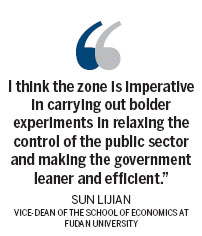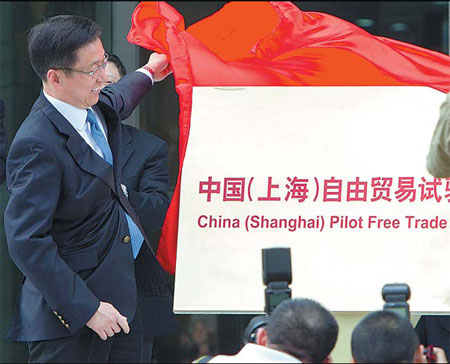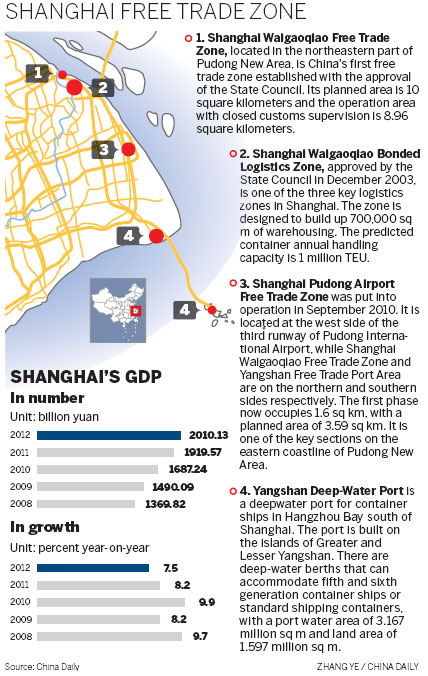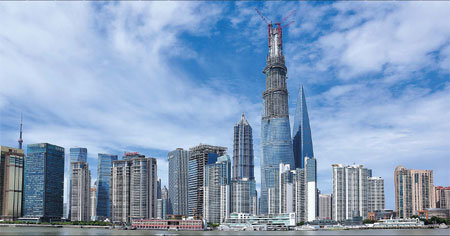Zone opens doors to the world
Updated: 2013-10-04 08:59
By He Wei and wei tian (China Daily)
|
|||||||||||
Free trade Area seen as role model and pilot project for economic reform
The China (Shanghai) Pilot Free Trade Zone, which officially opened on Sept 29, is widely expected to create an efficient market environment for domestic and foreign enterprises in a wide variety of businesses.
The aim is to free up the overloaded administrative approval system and introduce measures to encourage innovation and internationalization.
Commerce Minister Gao Hucheng says the zone is set to become a pilot project for economic reform and a role model in efforts to upgrade the Chinese economy.
Dai Haibo, deputy secretary-general of the Shanghai municipal government and vice-director of the zone's management committee, says the guiding principle is to shift the overriding role of the government from administrative to supervisory. Enterprises will no longer need to seek government approval for many of the things they want to do in the zone.
In three years, the country will build on the experience gleaned from the Shanghai free trade zone, and further reform targets may be set, Dai says.
These include, in certain areas, no administrative approval required for company registration, no restrictions in equity ratios and limited disclosure requirements.
The cornerstones are the reform of power structures and government transparency, with positive changes in policy coordination, information tracking and effect evaluation.
A case in point is the treatment of foreign investors as nationals in economic sectors that are not specifically restricted, says Liu Yajun, director of the department of foreign investment administration with the Ministry of Commerce.
To encourage and simplify foreign investment, an Internet-based registration system will be introduced for enterprises whose business portfolios do not fall in the restricted areas, Liu says.
That would in effect shorten the registration period from the current 29 days to a minimum of four days, Dai said.
A fast-track channel has also been established to lure financial institutions with strong profitability and risk-control capabilities to enter the zone, says Liao Min of the Shanghai branch of the China Banking Regulatory Commission.
He confirmed that banking regulators will adjust loan-to-deposit ratios and other regulatory requirements for banks operating in the area.
A series of customs clearance and supervision policies have been initiated to offer more complete, convenient and transparent foreign trade services, says Zhang Wansheng, director of the General Administration of Customs' processing trade and bonded system department.

For instance, companies can have their cargo transported into warehouses before they declare customs, says Zhang, adding that a unified information monitoring system will be set up to supervise entrants.
The government says it would enhance the efficiency of customs administration, improving the speed and ease with which imports and exports can clear customs and the quality and range of services national customs authorities provide, says Liu Deping, director of the border check department of the General Administration of Quality Supervision, Inspection and Quarantine.
"To facilitate easier trade, authorities have lowered the threshold for inspection and quarantine to avoid rigorous inspections and customs assessments and therefore reduce companies' costs," Liu says.
Eighteen directives, including the launch of an information sharing platform and an early warning system, are being introduced to relieve administrative burdens for companies, he said.
"The waiver or less restricted export product examinations will save companies time and money spent renting warehouses," says Zhao Pei'en, a certified public accountant in Shanghai, adding that such reform spells a "substantial bonus" for a wide range of industries.
This will simplify the registration process in setting up a business, says Liu Jun, China chief representative of Northern Melbourne Institute of TAFE, an Australian vocational training institute.
"In our case, the new framework saves us time and effort to turn to the Ministry of Education each time we wish to get our programs approved," says Liu, who was cheered by the fact that joint venture educational and job-training institutions are included in the 18 sectors open to foreign investment.
Liu said he is seeing a decentralized government structure, and hopes that the zone encapsulates all the functions companies need to get businesses going.
China's economic and social development requires more intense reforms, as unnecessary government intervention in the private sector has resulted in abuses of power, says Sun Lijian, vice-dean of the School of Economics at Fudan University.
"I think the zone is imperative in carrying out bolder experiments in relaxing the control of the public sector and making the government leaner and efficient."
The Shanghai project is seen as a testing ground for a series of policy-based changes deemed necessary to facilitate sustainable economic growth.
The projected rewards are huge, but the challenges are daunting.
Shanghai has embarked on building itself into a global financial center while moving to restructure its economy amid a climate of slower growth. However, it is hampered by its financial structure, regulatory environment and a prevailing sense of bureaucratic inertia.
Although the Chinese economy has seen a slight revival in recent months, two straight years of moderate growth set against a background of strict policy controls have threatened to derail the push to move in ambitious new directions.
As such, the free trade zone may serve as the city's white knight. While details remain vague, analysts believe the zone will become a catalyst to bolster the city's development and spur innovation.
Shanghai's economic output has fallen below the national average since early 2011, when local authorities vowed to move it away from dependence on bulk manufacturing to the service sector.
The transformation is just beginning to pay dividends. For instance, in the first half of this year, the service sector, which encompasses property, finance, telecommunications and tourism, saw faster growth than the agricultural and industrial sectors.
The service sector edged up 1.3 percentage points from 2011 to 2012 and grew 9.6 percent to account for 61.7 percent of the city's GDP as China accelerates its transformation into a service-oriented and consumption-based economy.
However, such sweeping change has not managed to stem an overall decline in the city's economic growth. It missed the national GDP growth by 0.2 percentage point last year.
Trade also contracted for the first time in three years, with exports falling 1.4 percent year-on-year, according to data supplied by the Shanghai Municipal Bureau of Statistics.
From January to June, trade shrank 3.7 percent compared with the first six months of 2011, with exports dropping 4.3 percent and imports falling 3.2 percent over the same period.
Michael McDonough, senior economist at Bloomberg LP, says slower growth is almost a necessity as China moves away from its reliance on exports and shifts toward greater domestic consumption, with the private sector posited as a major growth engine.
But according to the latest data in 2011, household consumption would need to increase by almost 1.5 percent to offset a 1 percent decline in China's gross capital, McDonough says.
"I think Shanghai has been one of the slowest-growing cities in China for a while. The free trade zone will definitely boost its growth in the long run," he says.
Others hope the zone will catapult Shanghai to the forefront of global trade and cement its status as a world-leading financial hub.
It will also help the city cut the costs of trade and improve efficiency, says Sun Lijian, a professor of economics at Fudan University.
"Goods in the zone may be landed, handled, manufactured or reconfigured and re-exported without the intervention of customs authorities," he says.
Sun said such a tariff-free environment would foster offshore trade and offer tantalizing new opportunities to Chinese exporters keen to expand their production capabilities to other low-cost markets in the region. He adds that such rules would also help them concentrate on the higher-value-added front and back ends of the manufacturing process.
In the coming years, Shanghai's financial reforms may support China's gradual transition toward consumption-led growth, says Dan Steinbock, research director of international business at the India, China and America Institute in the US.
"In order to support the ordinary Chinese social model, the mainland needs more sophisticated financial services. When people feel that their future is more secure, they will consume more."
On a national level, the Shanghai free trade zone could act as a trailblazer in prodding other markets to open up as it helps improve China's economy. Policy makers have already signaled that they hope to hasten the convertibility of the yuan over the next few years to boost its use in trade and support wider financial reforms.
Shanghai is not presently equipped to handle offshore trade or financial transactions like its regional counterparts Hong Kong or Singapore, Sun says. Opening the door to foreign banks is conducive to jumpstarting an offshore yuan market in the free trade zone, he says.
As the free trade zone may lead to more experimentation with a fully convertible Chinese currency, the city will morph into an international financial hub faster than expected, Steinbock says.
Shanghai Mayor Yang Xiong has already told the city's legislators to work toward building a solid legal framework for the free trade zone, as the reform measures will require about a dozen laws to be modified.
He said initial research has shown there are more than 90 detailed reform measures ready to be launched in the free trade zone, most of which will focus on innovation.
Xiamen, Tianjin and other coastal cities have also submitted applications to set up FTZs, as have provinces, including Jiangsu, that neighbor Shanghai.
But Lu Bin, a professor with Nanjing University of Finance and Economics, expressed concern that such pioneering reforms in Shanghai could dilute the competitiveness of cities in Jiangsu that were recently granted favorable policies.
Once the zone eases controls on how foreign exchange is managed, another pilot zone in Kunshan in Jiangsu province that is run in cooperation with Singapore will "enjoy no comparative advantage," he says.
Kunshan, which lies on the outskirts of Shanghai, could also be negatively affected as many of the foreign multinationals that now base their headquarters there will be tempted to relocate to the new FTZ, he says.
But Jiang Hongkun, Party chief of Suzhou, sees more opportunities than challenges. "Just as Suzhou depended for its growth on the development of Pudong New Area, so the new zone will present us with more opportunities," he says.
Experts say the zone also represents a counter-challenge to other recent developments such as the Trans-Pacific Partnership. This US-led initiative is widely seen as a move to curtail China's growing influence on global trade.
Wei Jianguo, secretary-general of the China Center for International Economic Exchanges, says the partnership could be seen as the first step toward establishing an Asia-Pacific free trade zone. As such, he says China could take the initiative in joining it to maximize the benefits for the region as a whole.
The Shanghai zone could play an active role in such a mission, as its reform measures may answer certain partnership requirements pertaining to government subsidies and intellectual property, he says.
"Today, people like to say that Shanghai is about to become a 'mini-Hong Kong.' But, over time, Hong Kong may look like a 'mini-Shanghai,"' Steinbock says.
Contact the writers through hewei@chinadaily.com.cn
|
Above: The free trade zone will take Shanghai's reform and opening up to a higher level. Below: Shanghai's top leader Han Zheng at the inauguration ceremony of the Shanghai free trade zone on Sept 29. Thirty-six companies were given licenses to operate in the zone, which covers more than 28 square kilometers. Gao Erqiang / China Daily, Zhou Dongchao / China Daily |


(China Daily European Weekly 10/04/2013 page16)
Today's Top News
China, Russia co-work for security in Asia-Pacific: Xi
Animal welfare to be added in training
Talks 'can help Chinese banks' in UK
Robust home sales during holiday
APEC 'should take lead' in FTA talks
Beijing targets polluting cars
China warns US, Japan, Australia over sea issues
US on path to default if Obama won't negotiate
Hot Topics
Lunar probe , China growth forecasts, Emission rules get tougher, China seen through 'colored lens', International board,
Editor's Picks

|

|

|

|

|

|






